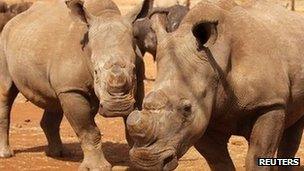South Africa record for rhino poaching deaths
- Published

Some game farms in South Africa have resorted to de-horning rhinos before poachers get to them
The demand for rhino horns has led to record poaching this year in South Africa, wildlife charity WWF has said.
Figures from South Africa National Parks show 341 rhinos have been killed so far in 2011, already outstripping last year's record total of 333.
WWF says the spike in poaching in Africa and South Asia is largely caused by increased demand for rhino horn in Vietnamese traditional medicine.
Poachers saw off a darted rhino's horn, leaving the animal to bleed to death.
In the five years up to 2005, an average of 36 rhinos were killed each year in South Africa.
The WWF said law enforcement efforts were increasing, but were not sufficient to stop the smuggling and sale of their horns by organised crime rings.
South Africa has been the focal point of poaching because it has the largest population of rhinos in the world, with 1,916 black rhinos and 18,780 white rhinos, the conservation group said.
The rhino horn trade is regulated by the Convention on International Trade in Endangered Species (Cites) and at present South Africa only allows the export of horns as hunting trophies.
WWF said improvements were needed in the regulation of hunting permits and the management of rhino horn stock piles in the country.
"Since armed protection for rhinos in South African national parks is strong, poaching syndicates are likely to shift to countries with weaker enforcement power, including possibly Asian countries that may be caught off-guard," Carlos Drews, global species programme director at WWF, warned in a statement.
South Africa's government has commissioned a study into whether legalising trade in rhino horn could help to bring down poaching.
In Vietnam many believe that ground rhino horn can be used to cure cancer - although there is no scientific proof of this - and horns taken to the the Middle East are used to make handles for ornamental daggers.
- Published30 October 2011
- Published7 February 2011
- Published17 August 2010